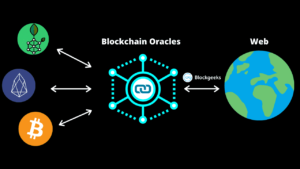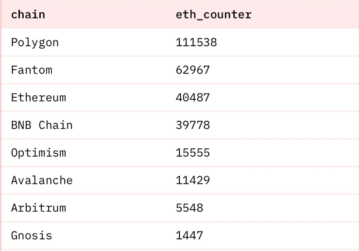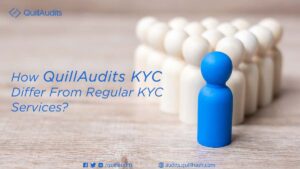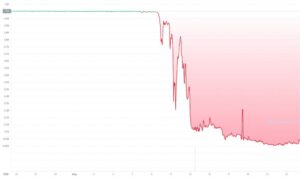Peter Drucker once quoted, “Innovate or Die!” This gave birth to Binance Chain and ultimately Binance Smart Chain. Binance chain, due to its dual-chain architecture, has successfully pulled the attention of the masses.
It has also grabbed the attention of attackers resulting in various hacks and exploits in the recent past. While the concept of the Binance smart chain may not seem new to you, and you might be familiar with various verticals associated with it. There may exist some nooks-and-corners that would be unclear or may have emerged multiple times before to put you in a dilemma.
To untangle those tangled doubts with an in-depth vision, we have come up with the top 5 burning FAQs on Binance Smart Chain. Hence, in the forthcoming sections, we will discuss Binance Chain as a concept, its various verticals and dive deep into those five questions that may have been haunting you for so long!
So, let’s begin our journey and look at the Binance Smart chain with QuillAudits lenses that have witnessed security audits of over 200+ clients globally.
What is Binance Smart Chain?

Binance Smart Chain (BSC) is a Blockchain-based network used for running applications rooted in smart contracts. BSC works in parallel with Binance’s native Binance Chain (BC), allowing users to take advantage of the rapid transaction capacity of BC as well as smart contract features of BSC.
Apart from that, BSC also supports Ethereum Virtual Machine (EVM), due to which it can run applications based on Ethereum (like MetaMask).
The platform’s main purpose is to help developers create decentralized applications (DApps) and allow users to govern their digital assets.
Well, that was a short introduction about Binance Smart Chain; in the coming sections, we will look after the most frequently asked questions on BSC.
#1. How Binance Smart Chain Works?
Consensus
Binance Smart Chain gets a block time of ~3 sec with the Proof-of-Stake consensus algorithm. All the stakeholders reinforce BNB to become validators when it implements Proof of Staked Authority (or PoSA).
Cross-Chain
The core idea behind Binance Smart Chain was to develop it as an independent & supportive system to the existing Binance Chain. Dual-chain architecture is used so that users can exchange the assets of one Blockchain with another.
The compatibility of BSC with EVM provides it an advantage to use tools & dApps such as Metamask, Truffle, and Remix.
#2. What are the Security Concerns with BSC Smart Chain?
Transactions on BSC have surpassed those taking place on Ethereum by 70%, thus showing its popularity and making it prone to potential attacks. While the BSC threats are no different from ones happening in the crypto sphere, it is similar to the 2017 ETH buzz that attracted a significant volume of users and investors, which later became potential targets of attackers.
But now the question of the hour is; Is the BSC safe?
The BSC network and the algorithms used by this are safe, and the recent track record of BSC indicates that there are very few attack vectors or possibilities that can lead to a potential threat for the BSC ecosystem. The security team and the bounty programs test for various potential threats on the BSC’s security vertical to ensure that no possible vulnerability is left unnoticed.
#3. How are Audits Conducted for a Smart Contract on BSC?
Recent hacks and exploits have already depicted what an unaudited code can do to your DeFi platform. Loss in millions and devastation to the platform’s reputation in itself is enough reasons for anyone to get their smart contract audited multiple times from a trustworthy firm such as QuillAudits.
We follow a comprehensive strategy to conduct a smart contract audit; our audit strategy follows:
- Gathering Code Design Patterns
- Unit Testing
- Manual Analysis
- Initial Report
- Code Fixed
- Static Analysis & Formal Verification
- Final Report
#4. What are Possible Vulnerabilities in BSC Smart Contract?
As we have already pointed out, BSC smart contracts are prone to vulnerabilities, and these are due to miners having majority control over the network. Some of the vulnerabilities may be complex, but most of them are due to minute mistakes in coding, such as :
- Function permission(modifier)
- Typos
- Incorrect number of digits
- Missing/incorrect variable value assignment

The other known vulnerabilities include – re-entrancy, gas limit issues, timestamp dependencies, font-running, and DDoS attacks. Another type of attack that has emerged in the last few months is the ‘Flash Loan‘ attacks.
#5. What are the Risks associated with Binance Smart Chain?
From the very beginning, Binance Smart Chain has provided its user with an advantage of smart contract functionalities, speed, flexibility, and a range of dApps, yet it has some loopholes.
The risk associated with Centralization
Decentralization is the prime feature of the Blockchain that removes the intermediaries, but Binance Smart Chain lacks the decentralization feature due to the way it is operated.
Binance is the stellar product of the BSC, one of the largest cryptocurrency exchanges; according to Dr. Craig Wright, “Binance is the owner and controller of the system. The fact it is run on many servers means that it is distributed and not decentralized.”
There is no hidden fact about the risks associated with Binance Smart Chain, and it’s up to users to weigh the pros and cons of the BSC.
Risks with Proof-of-staked Authority
The proof-of-stake authority runs the BSC shortfalls on the decentralization parameter because of its limited number of validators. There is high transaction throughput involved with BSC, and it increases with the increase in network size more quickly than Ethereum.
Final Word
That was our short but comprehensive list of top five FAQs on Binance Smart Chain. Though we may not have covered various topics exhaustively, we are confident of the clarity of thought you have by going through the above mentioned points. You can always reach out to us in case you are left with any questions at the back of your mind.
Though, whether you are already taking advantage of BSC or want to leverage this DEX, you can connect with us to get your platform secured. We’re a team of experienced professionals with an auditing experience of securing assets worth billions by concluding auditing of over 200+ smart contracts.
Reach out to QuillAudits
QuillAudits is a secure smart contract audits platform designed by QuillHash
Technologies.
It is an auditing platform that rigorously analyzes and verifies smart contracts to check for security vulnerabilities through effective manual review with static and dynamic analysis tools, gas analysers as well as simulators. Moreover, the audit process also includes extensive unit testing as well as structural analysis.
We conduct both smart contract audits and penetration tests to find potential
security vulnerabilities which might harm the platform’s integrity.
If you need any assistance in the smart contracts audit, feel free to reach out to our experts here!
To be up to date with our work, Join Our Community:-
Twitter | LinkedIn | Facebook |Telegram TwitterFacebookLinkedIn
Source: https://blog.quillhash.com/2021/09/03/top-5-burning-faqs-on-binance-smart-chain-auditing/
- &
- 9
- ADvantage
- algorithms
- All
- Allowing
- analysis
- applications
- architecture
- Assets
- Attacks
- audit
- authority
- binance
- binance chain
- Binance Smart Chain
- blockchain
- bnb
- BSC
- Capacity
- clients
- code
- Coding
- coming
- Consensus
- contract
- contracts
- controller
- Craig Wright
- Cream
- Cream Finance
- crypto
- cryptocurrency
- Cryptocurrency Exchanges
- DApps
- DDoS
- Decentralization
- DeFi
- Design
- develop
- developers
- digital
- ecosystem
- ETH
- ethereum
- exchange
- Exchanges
- experience
- Feature
- Features
- finance
- Firm
- Flash
- flash loan
- Flexibility
- follow
- Free
- GAS
- hack
- hacks
- High
- How
- HTTPS
- idea
- Increase
- Investors
- involved
- issues
- IT
- join
- lead
- Leverage
- Limited
- List
- loan
- Majority
- Making
- MetaMask
- Miners
- months
- network
- Other
- owner
- platform
- Product
- professionals
- Programs
- proof
- Proof-of-Stake
- range
- reasons
- review
- Risk
- Run
- running
- safe
- SEC
- security
- Short
- Size
- smart
- smart contract
- Smart Contracts
- So
- speed
- Staked
- Stellar
- Strategy
- Supports
- system
- tests
- threats
- time
- top
- top 5
- Topics
- track
- transaction
- typeform
- users
- value
- Virtual
- vision
- volume
- Vulnerabilities
- vulnerability
- weigh
- Work
- works
- worth
- year












